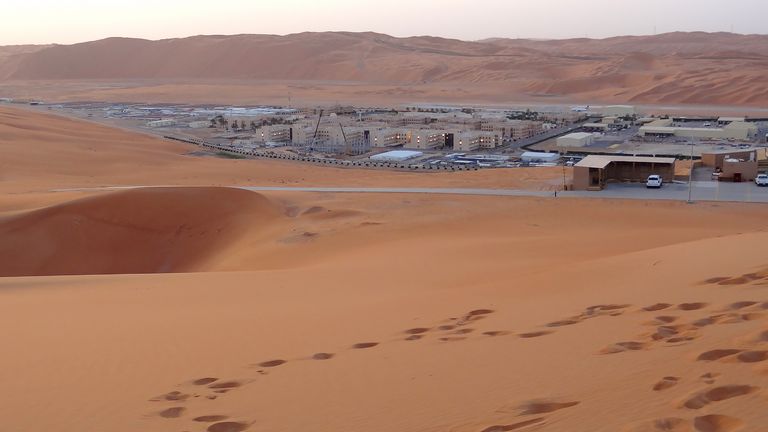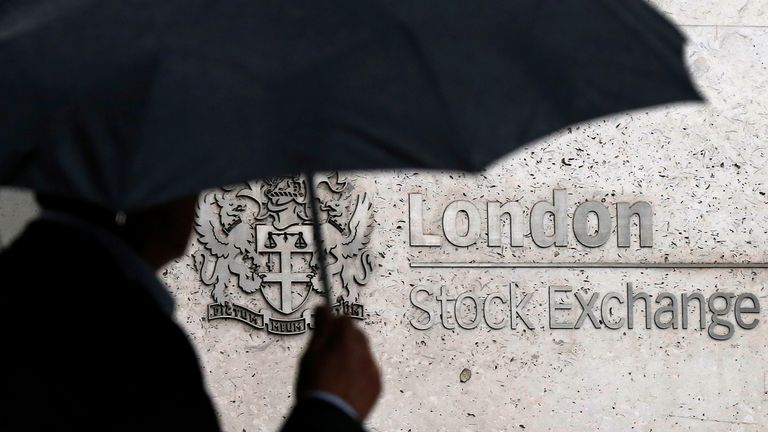Should UK bend IPO rules for Saudi Aramco?
To let Aramco float 5%, not 25%, of its equity would give the City a pre-Brexit boost, but risks future scandals, writes Ian King.
Thursday 8 June 2017 13:35, UK
It's the world's biggest ever stock market flotation and the London Stock Exchange is desperate to grab a slice of it.
Saudi Aramco, the desert kingdom's state-owned oil company, is preparing to sell shares in itself to outside investors as the country's rulers seek to raise money to plug a gap in their public finances.
The flotation could see Saudi Aramco valued at more than $1tn and so stock exchanges everywhere have been fighting it out to attract what would undeniably be a prestigious listing.
The main listing will be on the Riyadh Stock Exchange, known as the Tadawul, but the Saudis are also seeking a secondary listing for the shares.
New York, London, Tokyo, Hong Kong and Singapore are all keen to get the business.
To that end, during Theresa May's recent visit to Saudi Arabia, the Prime Minister is understood to have made the case for Saudi Aramco to list in London.
She was accompanied on her trip by Xavier Rolet, chief executive of the LSE, who also made a pitch for the business.
In the post-Brexit world, a listing of Saudi Aramco in London would be a powerful signal, sending out the message that the UK remains open for business to the rest of the world.
The for the City's lawyers, bankers and public relations advisers.
To strengthen its case, the UK listing authorities are thought to be relaxing their usual rules, enabling Saudi Aramco to enjoy a "premium listing" that would enable the company to qualify for membership of the FTSE-100 - guaranteeing buyers for the shares by index "tracker" funds that seek to replicate the Footsie's performance.
Under the current rules, at least 25% of the shares in companies enjoying a premium listing have to be freely tradable.
But with Saudi Aramco proposing to make only 5% of its shares tradable, with the rest remaining owned by the Saudi government, that would mean the rules would need to be bent.
This has gone down very badly with some of the City's institutional investors, and one of them - Royal London Asset Management - has argued publicly against any relaxation of the rules for Saudi Aramco.
Ashley Hamilton Claxton, the firm's corporate governance manager, said in a statement: "Any attempt to bend the listing rules in order to facilitate the IPO of Saudi Aramco is highly inappropriate and flagrantly ignores the principles which the UK's listing rules were designed to defend.
"We will be lobbying strongly against any concessions being granted should there be a formal attempt to IPO Aramco in the UK.
"As long term investors in the UK equity market, we fear this precedent could lead to a slippery slope."
Royal London is not the only unhappy investor.
The Investment Association, the industry body for fund management companies, made public a letter last week from its chief executive, Chris Cummings, to the Financial Conduct Authority, the main City regulator, in which he insisted the 25% minimum level for a premium listing should apply "irrespective of the size of the company being listed" and should be "preserved at all costs to protect the integrity and standard of the UK premium listing".
He didn't even mention Saudi Aramco by name, but the implication was obvious.
Why the strong opposition?
Well, it's mainly because institutional investors pension funds, insurance companies and so on like the requirement that at least 25% of a company's shares must be freely tradable. They believe it protects the interests of minority shareholders.
Some suggest the rules, if anything, could be tighter given how, for example, Mike Ashley has frequently run roughshod over the interests of minority investors in Sports Direct and, in the case of that company, there is a so-called "free float" of 45%.
The recent history of the London stock market is also littered with examples of why the 25% requirement was put in place in 2013.
It followed a string of disastrous flotations in the mining sector, such as the Indonesian coal miner Bumi and the Kazakh-based iron ore producer Eurasian Natural Resources Corporation (ENRC).
Both had small free floats, both had lousy corporate governance and both were embroiled in corruption scandals that ultimately cost shareholders a fortune.
The investment community is anxious that such incidents are not repeated.
No one is for a moment suggesting that Saudi Aramco is as bad a company. Its management is highly respected and its independent directors include people with impeccable reputations, such as Sir Mark Moody-Stuart, the former chairman of Royal Dutch Shell.
But bending the rules on its behalf would create a precedent that could potentially open the door to bad apples like ENRC or Bumi receiving a premium listing in future.
It's a huge dilemma for the UK listing authorities.
On the one hand, they want to give the City a huge pre-Brexit boost by winning the mandate for the most prestigious stock market flotation of recent times. On the other, they risk opening the door to future corporate governance scandals.






